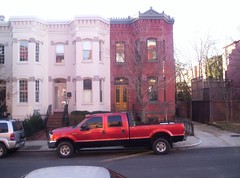Matter of right zoning provisions vs. urban design considerations
 It's time to update automobile parking strategies and relevant zoning regulations for the 21st century, and to not let these strategies be dictated by automobile owners and/or the industries (automobile, oil) that advocate that cars be accommodated at all costs.
It's time to update automobile parking strategies and relevant zoning regulations for the 21st century, and to not let these strategies be dictated by automobile owners and/or the industries (automobile, oil) that advocate that cars be accommodated at all costs.Yesterday's Post has an article, "Logan Circle Group Prays for Deliverance: Illegal Church Parking Mostly Ignored," about the impact of church parking on neighborhoods in the core of the city. From the article:
In a long-standing practice outside congregations across the city, one largely ignored by police, parishioners routinely descend on neighborhoods on Sundays and leave their cars in crosswalks and on the yellow stripes in the middle of the street and block cars by double parking.
I have been writing about this for awhile, and certainly since last March I have suggested that the DC Zoning Regulations be modified to require that churches--matter of right use in all residential zones--produce, implement, and revise transportation demand management plans to reduce the impact of traffic on the neighborhoods in which they are located.
This is especially important in the R4 zones that are typical of attached rowhousing. I mentioned a few weeks ago in this entry about parking issues, that the average rowhouse is 15-18 feet wide and can accommodate up to 1.5 cars in the space on the street in front of the house. (See "(Not) The Last word on Residential Parking Permits, Fees, and Policies.")
That, in reality, is an overestimate.
Even "small" cars like the Mini are about 12 feet long; the VW Beetle is 13.5 feet long. And most rowhouses are about 15 feet wide. With the wiggle room between cars, really, only about one car can be accommodated in the street space in front of the typical DC rowhouse.
 This truck is bigger than a Mini.
This truck is bigger than a Mini.As Jane Jacobs says, people are asking the wrong questions about cars--the question isn't "why aren't there enough parking spaces?," rather the question is "why are there so many cars?"
Clearly any household with more than one car stresses the inventory of available parking, and I disagree with the recent Common Denominator editorial ("Create parking") that calls upon the city to build residential parking structures to allow households to buy and park cars with impunity.
The issue is to deal with how many cars there are, and not to subsidize bad choices.
Getting back to problems with matter of right zoning provisions... clearly all "matter of right" uses are not created equal.
Uses that generate stresses on the road and parking network really need to be placed in areas where the negative impacts can be minimized.
Institutional uses such as churches, schools (see this article from the Examiner, "D.C. residents file suit to block Northeast preschool") and other public facilities should not have the unfettered right to be placed anywhere, they should have to be placed strategically, with access to transit, and perhaps, extant parking that is in keeping with Jane Jacobs' discussion of the parking aspects of "mixed primary uses" in Death and Life of Great American Cities. (She says that dedicating parking to buildings-uses specifically wastes space and resources and should be shared, in part, by time shifting uses.)
_________________
By the way, someone sent me a link to San Francisco's current attempts to change its parking policies, which is being voted on tomorrow. See "Residential Parking Reform for Downtown San Francisco," from the Transportation for a Livable City website.
Interestingly enough, San Francisco's experience is a little different than DC's these days. In SF, condos without parking sell faster than condos with parking. Like DC, they find that:
The 2000 census found that approximately 30% of San Francisco households didn’t own a car; the percentage of car-free households in transit-rich areas exceeds 50%, including up to 70% in the Mid-Market and Tenderloin neighborhoods. All the downtown housing currently being developed with one (or more) parking space per unit will change the character of transit-rich downtown neighborhoods.
The "take away" here is the necessity to continue to build and extend transit options, and to make it harder, not easier, to own a car, especially more than one per household.
(Also see "The cost to transit from free parking (Minneapolis survey)," "High Cost of Free Parking and Comments on Zipcar & Flexcar," and for extra credit, because this isn't about residential parking, "Here's an idea--it's too politically perilous to increase gasoline excise taxes, how about eliminating free parking at the office?")
Rather than build neighborhood parking structures, put the money into rebuilding neighborhood commercial districts, improving bus service, and bring back the streetcars--all of this sooner rather than later.
Index Keywords: parking; zoning-regulations



0 Comments:
Post a Comment
<< Home